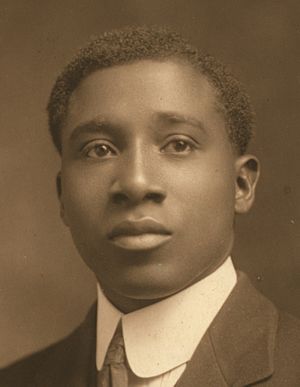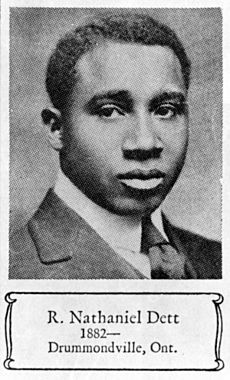Robert Nathaniel Dett facts for kids
Quick facts for kids
Robert Nathaniel Dett
|
|
|---|---|
 |
|
| Born | October 11, 1882 Niagara Falls, Ontario, Canada |
| Died | October 2, 1943 (aged 60) During a USO tour |
| Resting place | Niagara Falls, Ontario, Canada |
| Pen name | R. Nathaniel Dett |
| Occupation | Composer, choral director, organist, pianist |
Robert Nathaniel Dett (born October 11, 1882 – died October 2, 1943) was a talented Black Canadian-American composer, organist, and pianist. He was also a director for choirs and a music professor. Dett was born in Canada and lived there until he was 11. Then, his family moved to the United States. Most of his music education and career happened there.
During his life, he was a very important Black composer. He was known for using African-American folk songs and spirituals in his piano and choir music. He wrote in the Romantic style of Classical music. Dett was one of the first Black composers to gain fame when the American Society of Composers, Authors and Publishers (ASCAP) was new. He performed his music at famous places like Carnegie Hall and the Boston Symphony Hall.
Contents
Early Life and Musical Beginnings
Robert Nathaniel Dett was born in 1882 in Drummondville, Ontario, Canada. This area is now part of Niagara Falls, Ontario. His mother, Charlotte, was from Drummondville. His father, Robert, was from the United States. Dett's family had ancestors who were enslaved people who escaped to Canada.
Young Dett loved the piano from a very early age. He showed interest when he was just three years old. He started piano lessons when he was five. His mother also encouraged him to read and memorize parts of works by famous writers like Shakespeare and Longfellow.
In 1893, his family moved to Niagara Falls, New York, in the United States. When he was about 14, Dett played piano for his local church. He continued his music studies at different schools. He went to the Oliver Willis Halstead Conservatory of Music from 1901 to 1903.
Discovering Spirituals in Classical Music
Dett later studied piano at the Lockport Conservatory. He then went to the Oberlin Conservatory of Music in Ohio. There, he learned about using spirituals in classical music. He was inspired by the Czech composer Antonín Dvořák. Dvořák had toured the U.S. and used American music in his own works, like the New World Symphony.
Dett was also influenced by Samuel Coleridge-Taylor. This composer wrote music based on the poem The Song of Hiawatha. Some of this music reminded Dett of the spirituals his grandmother taught him. In 1908, Dett became the first Black American to earn a Bachelor of Music degree from Oberlin. He studied composition and piano.
After college, Dett toured as a concert pianist. During this time, he mostly wrote simple piano pieces. He met Emma Azalia Hackley, a singer, who encouraged his interest in Black American folk music.
A Career in Music and Education
After graduating, Dett began teaching music. He taught at Lane College in Tennessee. Then, he taught at the Lincoln Institute in Jefferson City, Missouri. During these years, he wrote choir and piano pieces that his students could play.
Hampton Institute and Choral Success
In 1913, Dett started teaching at the Hampton Institute in Virginia. In 1926, he became the first Black director of music there. He stayed at Hampton for almost 20 years, until 1932. During his time, he started the Hampton Choral Union, the Musical Arts Society, and the Hampton Institute Choir. He also founded the School of Music.
The Hampton Choir became famous around the world. They specialized in African American sacred music. They performed Dett's own music and his arrangements of other songs. Dett also encouraged his student, Dorothy Maynor, to become a concert artist. She followed his advice and became a leading singer.
In 1914, Dett became known as a major pianist-composer. His piece Magnolia was performed at the Samuel Coleridge-Taylor Club. The Chicago Evening Post newspaper praised his work. They said his pieces were very new and that his piano skills were excellent.
On December 27, 1916, Dett married Helen Elise Smith. She was the first Black person to graduate from the Institute of Musical Art in New York City. This school later became the famous Juilliard School.
Dett's Musical Vision
In 1918, Dett wrote about his goals for music. He believed that the folk music of enslaved people was a "wonderful store." He wanted musicians to use this music. He felt they should turn it into choir music, operas, concertos, and other forms. He wanted to show that Black people also had "national feelings and characteristics" through music.
Dett never stopped learning about music. He studied at many well-known schools. These included Columbia University and Harvard. In 1919, he started the Musical Arts Society. This group organized concerts with famous artists like Marian Anderson.
From 1920 to 1921, he studied at Harvard University. He won two awards there. His choir song "Don't Be Weary Traveller" won the Francis Boott Award. His essay "The Emancipation of Negro Music" won the Bowdoin prize.
Dett also created collections of spirituals. These included Religious Folksongs of the Negro (1927) and The Dett Collections of Negro Spirituals (1936). He received a Holstein prize for his work as a composer.
Leadership and Later Career
From 1924 to 1926, Dett was the president of The National Association of Negro Musicians. This is the oldest group in the U.S. that works to save and promote African-American music.
In 1929, Dett traveled to France to study music. He earned a Masters of Music degree in 1932.
After leaving Hampton Institute in 1933, Dett became a choir conductor for NBC radio shows. He wrote a large musical work called The Ordering of Moses (1937). It was first performed in 1937 with a choir of 350 singers and the Cincinnati Symphony Orchestra.
From 1937 to 1942, Dett was a Visiting Director of Music at Bennett College in North Carolina. He toured Canada and the U.S. with their choir. They also performed on CBS radio.
Later in his career, Dett changed his musical style. He started using more modern sounds. He wrote piano suites like Tropic Winter (1938) and Eight Bible Vignettes (1941–1943).
Dett joined the United Service Organization (USO) during World War II. He worked as a choir advisor to help support U.S. troops. He died of a heart attack on October 2, 1943, while traveling with the USO chorus. He was buried in his hometown of Niagara Falls, Ontario, Canada.
Legacy and Recognition
Today, Robert Nathaniel Dett is best known for his music that blends European Romantic styles with African-American spirituals. His music is still performed. The Nathaniel Dett Chorale in Canada, started in 1998, is named after him. They perform his music and works by other composers of African descent.
In 2014, his work The Ordering of Moses was performed again. It was played in Cincinnati and at Carnegie Hall in New York.
Dett did not record much of his music. In 1912, he made some of the first commercial piano rolls by a Black pianist. These included five songs from his Magnolia Suite.
In 1993, a book about Dett's life and music was published. It was called Follow Me: the Life and Music of R. Nathaniel Dett.
The former British Methodist Episcopal Church in Niagara Falls, Ontario, was renamed in Dett's honor. He was the organist there from 1898 to 1903. In 2001, the church was named a National Historic Site of Canada.
The Robert Nathaniel Dett Elementary School in Chicago is also named after him.
Awards and Honours
- Bowdoin Literary Prize (1921), for his essay, "The Emancipation of Negro Music," from Harvard.
- Francis Boott Music Award for his choir song "Don't be Weary Traveller," from Harvard.
- Harmon Foundation Award.
- Honorary Doctorate (1924) from Howard.
- Honorary Doctorate (1926) from Oberlin College.
Compositions and Arrangements
Many of Dett's works were published. They include pieces for piano, choir, voice, organ, and orchestra:
- After the Cakewalk (1900)
- Cave of the Winds (1902), a march
- Magnolia (1912), a suite for solo piano
- In the Bottoms (1913), a suite with five movements
- Listen to the Lambs (1914), a religious anthem
- Music in the Mine (1916), a choir work
- I'll Never Turn Back no More (1916)
- The Chariot Jubilee (1921), for tenor, choir, and orchestra.
- Don't be Weary, Traveler (1921)
- Enchantment (1922), a suite for solo piano
- Listen to the Lambs (1923)
- Let us Cheer the Weary Traveller (1926)
- O Hear the Lambs A-Cryin' (1926)
- Religious Folksongs of the Negro (1927), a collection of arranged spirituals
- The Cinnamon Grove (1928), a suite for solo piano
- Ave Maria (1930)
- The Dett Collection of Negro Spirituals (1936)
- The Ordering of Moses (1937)
- Tropic Winter (1938), a suite for solo piano
- Eight Bible Vignettes (1941–1943)
- I am the True Vine (1943), for piano
- No More Auction Block (unpublished), for orchestra
In the Bottoms Suite
In the Bottoms is a piano suite with five parts:
- "Prelude (Night)"
- "His Song"
- "Honey (Humoresque)"
- "Barcarolle (Morning)"
- "Dance (Juba)"
Writings by Dett
- "The Emancipation of Negro Music." Southern Workman (1918): 172–6.
- "From Bell Stand to Throne Room." Etude Music Magazine 52 (1934): 79–80.
See also
- List of Canadian composers
- Music of Canada
- Nathaniel Dett Chorale
- Zenobia Powell Perry, one of his students
 | James Van Der Zee |
 | Alma Thomas |
 | Ellis Wilson |
 | Margaret Taylor-Burroughs |


